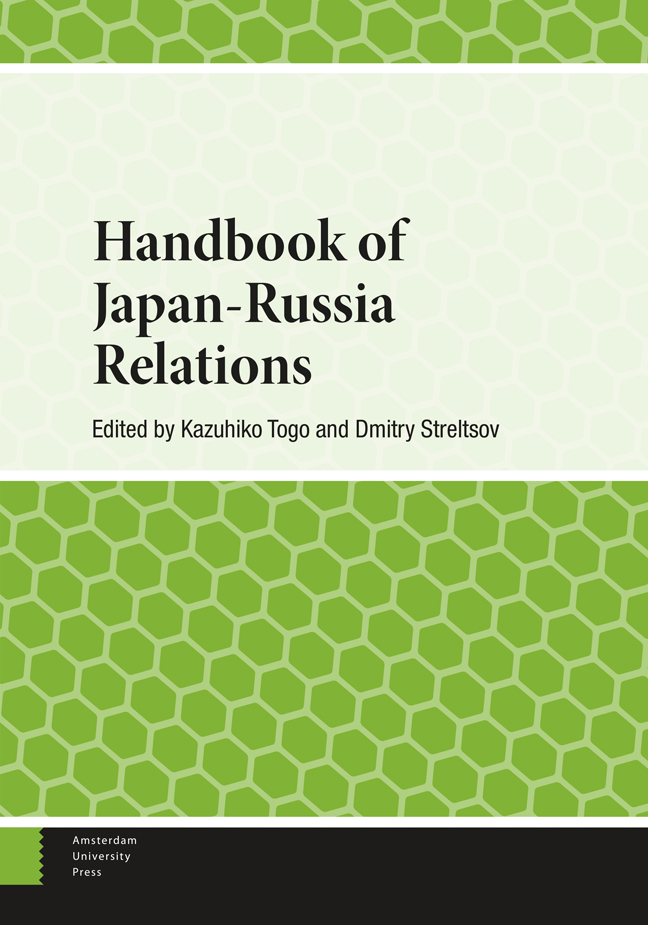Book contents
- Frontmatter
- Contents
- Dedication
- Acknowledgements
- Contributors
- Abbreviations
- Introduction
- Part 1 War and Peace: Diplomatic Relations and Security
- Part 2 Territory
- Part 3 The Economy and Energy
- Part 4 Disaster Cooperation
- Part 5 Culture
- Part 6 Perceptions of the Other
- Appendix 1 1956 Joint Declaration
- Appendix 2 Tokyo Declaration (1993)
- Appendix 3 Moscow Declaration (1998)
- Appendix 4 Irkutsk Statement (2001)
- Appendix 5 Foreign Ministry Statement (2022)
- Index
1 - Russo-Japanese Relations: The Past and the Present
Published online by Cambridge University Press: 26 March 2024
- Frontmatter
- Contents
- Dedication
- Acknowledgements
- Contributors
- Abbreviations
- Introduction
- Part 1 War and Peace: Diplomatic Relations and Security
- Part 2 Territory
- Part 3 The Economy and Energy
- Part 4 Disaster Cooperation
- Part 5 Culture
- Part 6 Perceptions of the Other
- Appendix 1 1956 Joint Declaration
- Appendix 2 Tokyo Declaration (1993)
- Appendix 3 Moscow Declaration (1998)
- Appendix 4 Irkutsk Statement (2001)
- Appendix 5 Foreign Ministry Statement (2022)
- Index
Summary
This chapter provides an overview of the history of the relations between Russia and Japan from the first contacts in the late 17th century to the present. The broad picture of the relations includes analysis of the reasons of the periods of bilateral wars and conflicts and the periods of comparative warming characterized by both sides’ intentions to improve relations. A substantial part of the chapter is devoted to revealing the roots of the territorial problem and its influence on bilateral relations.
The early days
Russia and Japan are “eternal neighbors.” However, their contact, first, geographical, later, commercial, and, finally, political, began only after, in the late 17th and early 18th centuries, Russia expanded its territory in the East and reached the Western coast of the Pacific, and later went on to the Eastern coast, starting to colonize the northwestern part of the American continent.
At the same time, Japan started to advance towards the “northern seas”—towards Hokkaido (in Japanese the name of this island means “the way towards Northern seas.”) However, simultaneously, Japan continued to adhere strictly to the policy of limiting external contacts under its “closed country” (sakoku) policy. This isolationist policy, pursued by the Tokugawa Shogunate. was in place until the mid-19th century.
Russia attempted to establish relations with Japan primarily with the goal of commencing trade ties to provide its quickly growing population in the Far East with food and other goods. Meanwhile, Japan, which initially perceived foreigners as a potential threat to the sovereignty and, ultimately, independence of the country, reacted negatively to Russian requests to establish commercial, rather than political ties. For Russia, the problem of providing its Eastern territories with foodstuffs, as well as of searching for external markets to sell the goods obtained here, primarily furs, began to take on importance from the late 18th century. Delivering foodstuffs from the center of the country through the vast Siberian territories was becoming increasingly costly and time-consuming, especially in winter.
At the court in St. Petersburg and, generally, in Russia, knowledge about the faraway land of Japan was extremely limited. Fragmentary and sometimes. untrustworthy information was obtained from Chinese and Dutch sources, as well as from Japanese sailors shipwrecked in the Russian territory.
- Type
- Chapter
- Information
- Handbook of Japan-Russia Relations , pp. 3 - 18Publisher: Amsterdam University PressPrint publication year: 2024

